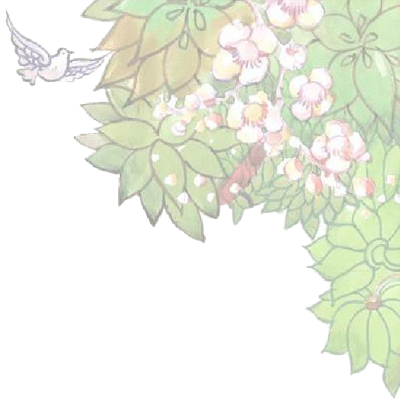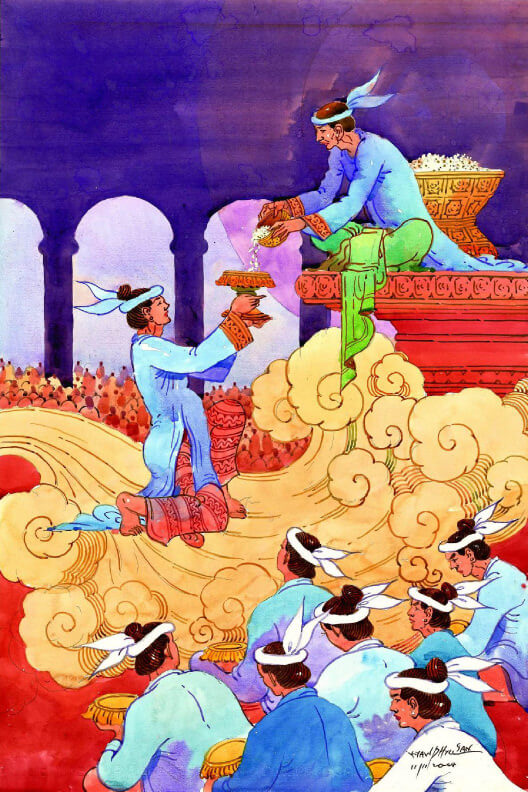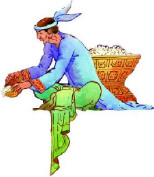68話 火葬、そして舎利の分配

第7部 入滅のあとに
最終章 ブッダの遺産
68話 火葬、そして舎利の分配

ブッダの般涅槃(パリニッバーナ)後、アーナンダ尊者とアヌルッダ尊者は法(ダンマ)について語り合って、残りの夜をすごした。夜明けになって、アヌルッダ尊者はアーナンダ尊者に、こういった。
「さあ、友、アーナンダよ、クシナーラーに行って、マッラ族の人びとに、こう告げなさい。『ヴァーセッタたちよ、尊師が亡くなられました。さあ、いつでもご随意に、お越しください』と」
「わかりました、尊者よ」と、アーナンダ尊者は応じた。朝のうちに衣を着て、外衣と鉢をもち、道連れの比丘とともにクシナーラーに入った。ちょうどそのとき、クシナーラーのマッラ族の人びとは、用事があって集会堂に集まっていた。アーナンダ尊者はその集まりに行って、アヌルッダ尊者からのことづてを伝えた。
その報せをきいたマッラ族の王族青年と、その子女、義理の娘、妻女たちは、悲嘆にくれ、苦悩と悲哀にうちのめされた。嘆き悲しんで、泣き叫び、髪をふり乱し、両手を突き上げ、身を投げ落とすように倒れ、のたうって、こう叫んだのである。
「あまりにも早く、世尊は般涅槃に到られ、入滅された! あまりにも早く、善逝は般涅槃に到られ、入滅された! あまりにも早く、智慧の眼をお持ちの方が世界から消えてしまわれた!」
火葬・・・世尊のご遺体を荼毘に付す
それからクシナーラーのマッラ族の王族青年たちは、クシナーラー中の香と花輪、あらゆる楽器を、従者に命じてサーラ林にもってこさせた。かれらは、香と花輪、あらゆる楽器、五百組の長布とともに、尊師のご遺体が横たわるサーラ林へ行った。そしてそこで、かれらは踊り、歌い、演奏し、花輪と香で、尊師のご遺体を敬い、敬意を払い、供養し、追慕して、日を過ごした。また、かれらは、長布で天幕を張り、円形のテントをつくった。そのとき、かれらは、こう考えた。
「いま、尊師のご遺体を火葬すると、きょうはもう遅すぎる。あす、荼毘に付すことにしよう」
そしてまた、同じように、二日目も、三日目も、四日目も、五日目も、さらに六日目も、供養して一日過ごしたのであった。
七日目に、かれらは、こう考えた。
「われらは尊師のご遺体を、踊り、歌い、演奏し、花輪と香で、十分に敬った。さあ、世尊のご遺体を南の方へ、街の外側にお運びして、荼毘に付すことにしよう」
そこで、マッラ族の王族青年たちのうちで主だった八人が、頭を洗い、新しい衣を着て、こう考えた。
「われらはいま、世尊のご遺体を持ち上げよう」
そして、力を合わせて世尊のご遺体を持ち上げようとしてみたのだが、できなかった。そこで、かれらはアヌルッダ尊者のもとへ行って、何が起きたのか話し、こう尋ねた。
「なぜ、世尊のご遺体を持ち上げようとして、われらには、できなかったのでしょうか?」
「ヴァーセッタたちよ、そなたらの意図がある一方で、神々の意図は別のものなのです」
「それでは尊師よ、神々の意図とは何なのですか?」
「ヴァーセッタたちよ、そなたらの意図は、『尊師のご遺体を、踊り、歌い、演奏して、花輪と香で、十分に敬い、世尊のご遺体を南の方へ、街の外側にお運びして、荼毘に付そう』というものでした。ところが、神々の意図は『尊師のご遺体を、踊り、歌い、演奏して、花輪と香で、十分に敬い、世尊のご遺体を北の方へ、街の北側にお運びしよう。それから、北門を通って街に運び、街の中央部を通り、その後に東門を通ってマッラ族のマクタバンダナ霊廟(天冠寺)へお運びしよう。そこにおいて、世尊のご遺体を荼毘に付そう』というものなのです」
「尊師よ、それでは神々の意図のとおりに合わせましょう」
ちょうどそのとき、クシナーラーは、ごみの山や積み上げたがらくたに至るまで、ひざに達するほどの曼荼羅華(マンダーラヴァ)がふりつもっていた。そして、神々とクシナーラーのマッラ族の人びとは、天界と人間界の舞踊、歌謡、花輪と香で世尊のご遺体を敬ったのである。かれらはご遺体を、北門を通って街に運び、街の中央部を通り、その後に東門を通って、マッラ族のマクタバンダナ霊廟へお運びして、安置した。
それから、かれらはアーナンダ尊者に、こう尋ねた。
「尊者よ、われらが如来(タターガタ)のご遺体をきちんとお取り扱いするには、どうすべきなのでしょうか?」
「ヴァーセッタたちよ、そなたらは転輪王(訳注:古代インドの理想的帝王。武器を用いず、法によって統治し、王に求められるすべての条件をそなえる、とされた。転輪聖王ともいう)の遺体を取り扱うように、如来のご遺体をお取り扱いしなければなりません」
「それでは、転輪王にはどのようにするのでしょうか、尊者よ?」
「ヴァーセッタたちよ、転輪王の遺体は、真新しい布で包みます。それから、よく梳かれた生綿でくるみ、さらにその上から、また別の真新しい布で包みます。このように、転輪王の遺体は五百層に重ねて包むのです。それから転輪王の遺体を金の油槽に入れて、また別の金の油槽で覆います。そうして、さまざまな芳香のする火葬薪をつくり、転輪王の遺体を荼毘に付すのです。火葬の後、遺骨を四つ辻の交差地に建立した塔(ストゥーパ)に収納します。これが、正義の転輪聖王となった転輪王の遺体をどのように取り扱うか、なのです。そして、これとまったく同じように、如来のご遺体をきちんとお取り扱いすべきなのです。如来のために四つ辻の交差地に塔(ストゥーパ)を建立すべきです。そして、そこに花輪や香料を献げ、礼拝して心を浄める者は、誰であっても、長いあいだ、利益と幸福を得るでしょう」
そこで、クシナーラーのマッラ族の王族青年たちは、従者に新しい布とよく梳かれた生綿を、マッラ族の王族青年たちの蔵から集めてくるように、と命じた。そして、かれらは、世尊のご遺体をアーナンダ尊者の指示にしたがって取り扱ったのである。
クシナーラーで弔いの儀式が始まっていたとき、マハー・カッサパ尊者は、五百人の比丘たちとともに、パーヴァーからクシナーラーに至る幹線の街道を旅して歩いていた。その途上で、街道をそれて、ある樹の下に連れの比丘たちと坐った。ちょうどそのとき、あるひとりの遍歴行者(アージーヴァカ、訳注:六師外道のひとりマッカリ・ゴーサーラが説いた無因無縁、業を否定する宿命論の徒で、裸形で遍歴し、邪命外道といわれる)が、手に曼荼羅華をもって、同じ街道をクシナーラーからパーヴァーへ歩いてきたのである。マハー・カッサパ尊者は、かれが遠くから近づいてくるのを見て、こう尋ねた。
「友よ、われらの師をご存じですか?」
「はい、友よ、知っています。ゴータマ行者は七日前に亡くなられました。わたしは、彼(か)の人の終焉(しゅうえん)の場所から、この曼荼羅華を採ってきたのです」
この悲報をきいて、いまだ愛着の情を乗りこえていない何人かの比丘たちは、髪をふり乱し、両手を突き上げ、身を投げ落とすように倒れ、のたうって、こう叫んだのである。
「あまりにも早く、世尊は般涅槃に到られ、入滅された! あまりにも早く、善逝は般涅槃に到られ、入滅された! あまりにも早く、智慧の眼をお持ちの方が世界から消えてしまわれた!」
しかし、渇愛からはなれた比丘たちは、正念と正知をそなえ、悲しみを耐え忍んだのであった。かれらは「諸行は無常である。生まれ、生じ、形成されたもの、そして、滅ぶはずのものが、どうして滅ばぬことがありえようか? それは不可能である!」と、いったのである。
ちょうどそのとき、そんな比丘の集まりのなかにスバッダという、年老いて出家した者がいて、こういったのだ。
「もうよい、友らよ! 悲しむな! 嘆くな! われらは、彼の偉大な行者から、首尾よく解放されたのだ。われらは彼の方から『これは、そなたたちがしてもよろしい。これは、そなたたちがしてはいけない』と、いわれて、つねに悩まされてきた。さあいまや、われらのやりたいことができるし、やりたくないことは、やらなくてもよいのだ」
(訳注:ここに登場するスバッダは、67話で「ブッダ最後の直弟子」となった遍歴行者のスバッダとは別人)
マハー・カッサパ尊者は、嘆いている比丘たちを、こう慰めた。
「もうよい、友らよ! 悲しむな! 嘆くな! 世尊はあらかじめ『すべての愛しいもの、好ましいものから、われらは別離を余儀なくされ、それらは変わりうるのです』と、説かれているではないか? 生まれ、生じ、形成されたもの、そして、滅ぶはずのものが、どうして滅ばぬことがありえようか? それは不可能なのだ」
一方、マッラ族の王族青年たちのうちで主だった四人が、頭を洗い、新しい衣を着て、こういった。
「われらは世尊の火葬薪に火をつけよう」
かれらは点火しようとしたのだが、火をつけることができなかった。かれらはアヌルッダ尊者のもとへ行ってそのわけを尋ねた。
「ヴァーセッタたちよ、そなたらの意図がある一方で、神々の意図は別のものなのです」
「それでは、尊師よ、神々の意図とは、どのようなものでしょうか?」
「ヴァーセッタたちよ、神々の意図とは、(マハー・カッサパ尊者が五百人の比丘たちとともに、パーヴァーからクシナーラーへの幹線の街道を歩いてきつつある。世尊の火葬薪に火をつけるのは、マハー・カッサパ尊者が世尊の御足を頭にいただき、礼拝してからで、それまでは点火しないであろう)というものです」
「尊師よ、それでは神々の意図のとおりに合わせましょう」
そのうちにマハー・カッサパ尊者が、世尊の火葬薪のところに到着した。衣を一方の肩にかけてととのえ、額の前で合掌して、火葬薪の周りを三たび、右に回った。世尊の御足は露わにされていたが、ほとんど触れんばかりのやりかたでマハー・カッサパ尊者は頭にいただき、礼拝した。五百人の比丘たちも同様にした。そして礼拝が終わったとき、世尊の火葬薪は自然に発火した。
それはバターや油が燃えると、灰や煤が出ないのとちょうど同じで、世尊のご遺体が荼毘に付されたときは、皮膚の外皮や内皮、筋肉、腱、関節液の、いかなる灰や煤も出なかった。ただ、ご遺骨(舎利)のみが残ったのである。そして、五百層に重ねて包んだ布のうち、最も内側と最も外側の二枚だけは焼けていなかった。
世尊のご遺体が焼き上がったとき、空からの滝の水と、雨の水が、周囲のサーラ樹から勢いよくほとばしって、火葬薪を消した。クシナーラーのマッラ族の王族青年たちもまた、あらゆる種類のよい香りのする水で消した。
それからマッラ族の人びとは、世尊のご遺骨をかれらの集会堂に留め置き、そして槍を手にした者たちで垣根をつくり、弓をもった者たちでとり巻く壁をつくった。かれらは七日のあいだ、舞踊、歌謡、花輪と香で、ご遺骨を敬い、敬意を払い、供養し、追慕したのである。
舎利の分配
マガダ国のアジャータサットゥ王が、世尊はクシナーラーで亡くなられた、と聞いたとき、ただちにクシナーラーのマッラ族に使者を派遣して、こういわせた。「世尊は王族であられた。わたしもまた、王族である。したがって、わたしは世尊のご遺骨(舎利)の分配を受けるのに値する。わたしもまた、世尊のご遺骨を奉納して祭る大きな塔を建立するであろう」
これと同じように、ヴェーサーリーのリッチャヴィー族、カピラヴァットゥの釈迦族、アッラカッパのブリ族、ラーマガーマのコーリヤ族、ヴェータディーパのバラモン、パーヴァーのマッラ族も、申し出た。世尊がクシナーラーで亡くなられた、と聞いて、かれらはただちにクシナーラーのマッラ族に使者を派遣し、世尊のご遺骨の分配を受けたい、舎利を奉納して祭る塔を建立するであろう、と申し出た。これらの張り合う七つの権利主張者たちは、もし要求が容れられなければ、争いも辞さず、とそろって表明したのである。
このような発言のすべてを聞いて、クシナーラーのマッラ族はかれらに、こう応じた。
「世尊は、われらの領地で亡くなられたのです。われらは世尊のいかなるご遺骨も、遠くの地へ分配するつもりはありません」
この回答のおかげで情勢が大いに緊迫した。まさに争いの危機に瀕したとき、ドーナ・バラモンがやってきて、かれらをなだめた。集まったかれらに、ドーナ・バラモンは次のように偈で告げた。
“みなさま、わたしが申し上げるひとことを、お聴きください!
われらのブッダはわれらに、忍耐、を教えてくださった。
その最も高貴な方の舎利の分配をめぐって
もし争いが起きるのなら、まさに、教えにはふさわしくない
みなさま、われらは和合して、平和裡に、
ともに喜んで、八分することに合意いたしましょう。
塔が、諸方に広がって、建立されんことを。
生けるものすべてが敬い、そして智慧の眼をお持ちの方に確信を得られるように”
そこで、集まった者たちは、こう応じた。
「なるほど、それではバラモンよ、世尊のご遺骨を、うまく、公平に、八つ均等に分けください!」
「承知いたしました、みなさま」と、ドーナ・バラモンは承諾した。かれは、世尊のご遺骨が入った金の柩を開けさせ、ご遺骨を公平に、八つ均等に分けた。分け終えたとき、かれは集まった者たちに、こう頼んだ。
「みなさま、どうか、この柩をわたしにください! わたしもまた、大きな塔を建立してこれを奉納し、供養いたします」
そこで、集まった者たちは、ドーナ・バラモンに柩を与えたのであった。
しかしながらこのとき、ピッパリヴァナのモーリヤ族もまた、世尊はクシナーラーで亡くなられた、と伝え聞いた。同様にして、かれらもクシナーラーのマッラ族に使者を派遣し、世尊のご遺骨の分配を要求したが、到着したのがあまりにも遅かったのである。
モーリヤ族の使者がクシナーラーのマッラ族の集会堂に着いたのは世尊のご遺骨の分配がちょうど終わってしまったときであった。使者が分配の要求を伝えると、クシナーラーのマッラ族は、こういった。
「世尊のご遺骨は、もう残っていません。すべて分配されてしまいました。あなた方は火葬場から、黒く焦げて焼け残った炭を、もっていってもさしつかえありません」
マガダ国のアジャータサットゥ王は、ラージャガハ(王舎城)に世尊の舎利を奉納して祭る大きな塔を建立した。ヴェーサーリーのリッチャヴィー族も、ヴェーサーリーに大きな塔を建立した。カピラヴァットゥの釈迦族も、カピラヴァットゥ(カピラ城)に大きな塔(ストゥーパ)を建立した。アッラカッパのブリ族も、アッラカッパに大きな塔(ストゥーパ)を建立した。ラーマガーマのコーリヤ族も、ラーマガーマに大きな塔を建立した。ヴェータディーパのバラモンも、ヴェータディーパに大きな塔を建立した。パーヴァーのマッラ族も、パーヴァーに大きな塔を建立した。クシナーラーのマッラ族も、クシナーラーに大きな塔を建立した。ドーナ・バラモンも、柩のための大きな塔を建立し、ピッパリヴァナのモーリヤ族も、ピッパリヴァナに黒く焦げて焼け残った炭を崇拝し、供養するための大きな塔を建立した。かくて、八つの舎利塔と、柩塔、炭塔それぞれ一つの、計十塔が建立されたのである。
※ 画像やテキストの無断使用はご遠慮ください。/ All rights reserved.

Episode 68 DISTRIBUTION OF THE BUDDHA’S RELICS
After the the Buddha’s Mahāparinibbāna, the Venerable Anuruddha and the Venerable Ānanda spent the rest of the night in conversation on the Dhamma. When it was dawn, the Venerable Anuruddha said to the Venerable Ānanda: “Now go, friend Ānanda, to Kusinārā and announce to the Mallas: ‘Vāseṭṭhas, the Lord has passed away. Now is the time to do as you think fit.’!”
“Yes, Venerable sir,” the Venerable Ānanda assented. Having dressed in the morning and taken his robe and bowl, he went with another bhikkhu to Kusinārā. At that time, the Mallas of Kusinārā were assembled in their meeting-hall on some business. The Venerable Ānanda came to them and delivered the Venerable Anuruddha’s message.
When they heard the news, the Malla princes, with their sons, daughters, daughters-in-law and their wives, were grief-stricken, struck with anguish and sorrow. Overcome by grief, they tore their hair, stretched out their arms, fell down and rolled back and forth, crying out: “Too soon has the Blessed One gone to attain Parinibbāna! So soon has the Sublime One gone to attain Parinibbāna! Too soon has
the Possessor of the Eye of Wisdom gone to vanish from the world!”
Honouring the Blessed One’s Body
Then, the Malla princes of Kusinārā ordered their men to bring perfumes, flowers and all the musical instruments from Kusinārā to the sāla grove. With the perfumes, flowers, all the musical instruments, and five hundred sets of long cloth, they went to the sāla grove, where the Lord’s body was lying. And there, they spent the day by
honouring, paying respect, venerating, and adoring the Lord’s body with dances, songs, music, garlands, and scents; and they made cloth canopies and set up pavilions with long cloth. Then, they thought: “It is too late now to cremate the Lord’s body today. We shall do so tomorrow.” And so, paying homage in the same way, they passed the second, the third, the fourth, the fifth, and the sixth day.
On the seventh day, they thought: “We have paid sufficient honour with songs, dances, flowers, and scents to the Lord’s body. Let us carry the Blessed One’s body southwards outside the town and cremate His body.”
Then, eight foremost elders of the Malla princes, having washed their heads and put on new clothes, thought: “We shall now lift the body of the Blessed One,” and exerted in unison to lift up the body of the Blessed One, but they were unable to do so. Then, they went to the Venerable Anuruddha and told him what had happened and asked: “Why can’t we lift up the Blessed One’s body?”
“Vāseṭṭhas, your intention is one thing, while the intention of the devas is another.”
“Then, Lord, what is the intention of the devas?”
“Vāseṭṭhas, your intention is this: ‘Having paid sufficient honour with songs, dances, flowers, and scents to the Lord’s body, let us carry the Blessed One’s body southwards outside the town and cremate the Blessed One’s body.’ But the devas’ intention is this: ‘‘Having paid sufficient honour with songs, dances, flowers, and scents to the Lord’s body, let us carry the Blessed One’s body northwards to the
north of the town. Then, bring His body through the north gate and bear it through the middle of the town, after which let us go out through the eastern gate to the Mallas’ shrine of Makuṭabandhana. There, let us have the Blessed One’s body cremated.’”
“Lord, let it be according to the intention of the devas.”
At that time, Kusinārā was all strewn knee-deep with coral-tree flowers, even to the middens and rubbish heaps. And the devas and the Mallas of Kusinārā honoured the Blessed One’s body with divine and human dances, songs, flowers, and scents; they carried the body northwards to the north of the town, brought it in through the north gate, through the middle of the town, and out through the eastern gate to the Mallas’ shrine of Makuṭabandhana, where they set the Blessed One’s body down.
The Cremation of the Blessed One’s Body
Then, they asked the Venerable Ānanda: “Lord, how should we properly deal with the body of the Tathāgata?”
“Vāseṭṭhas, you should treat the Tathāgata’s body in the same way as you would do to the body of a Universal Monarch.”
“And, how do they treat that, Lord?”
“Vāseṭṭhas, the body of a Universal Monarch is wrapped up in new cloths; it is then wrapped up again in carded cotton-wool, and over this it should be wrapped up with another new cloth. In this way, the body of a Universal Monarch is wrapped up in five-hundred twin layers. Then, they would place the Universal Monarch’s body in a golden oil-vat, which they cover with another golden vat. Then, having made a funeral pyre of various kinds of scented wood, they cremate the Universal Monarch’s body. After the cremation, they enshrine the relics in a stūpa which is built at the junction of four highways. That is how they treat the remains of a Universal Monarch who turns
the Wheel of Righteousness. And just as his remains are treated, so should the remains of the Tathāgata be treated. A stūpa should be erected at the junction of four highways for the Tathāgata. And whoever lays flowers or scents there with a devout heart will reap benefits and happiness for a long time.”
Then, the Malla princes of Kusinārā ordered their men to collect new cloths and carded cotton-wool from the store houses of the Malla princes. And they treated the remains of the Blessed One’s body according to the instruction of the Venerable Ānanda.
When the funeral ceremony took place in Kusinārā, the Venerable Mahā Kassapa was travelling along the main road from Pāvā to Kusinārā, with five hundred bhikkhus. On his way, he left the road and sat down under a tree together with his company of bhikkhus. At that time, a certain wandering ascetic (ājīvaka) was travelling by the same road from Kusinārā towards Pāvā, bringing with him a coral-tree flower. The Venerable Mahā Kassapa saw him coming from a distance and asked:
“Friend, do you know our Teacher?”
“Yes, friend, I know Him. The ascetic Gotama passed away seven days ago. I picked up this coral-tree flower from the place of His demise.”
Hearing the sad news, some of the bhikkhus who had not yet overcome their passions tore their hair, stretched out their arms, fell down and rolled back and forth, crying out: “Too soon has the Blessed One gone to attain Parinibbāna! So soon has the Sublime One gone to attain Parinibbāna! Too soon has the Possessor of the Eye of Wisdom gone to vanish from the world!” But those bhikkhus who were free from craving endured it mindfully and were fully aware. They said: “All compounded
things are impermanent. How could it be that what is born, come to being, formed, and bound to fall should not fall? That is not possible!”
At that time, amongst the assembly of bhikkhus was Subhadda, who had gone forth late in his life. He said to those bhikkhus: “Enough, friends! Do not grieve! Do not lament! We are well rid of the Great Ascetic. We were always troubled by His saying, ‘This is allowed to you; this is not allowed to you.’ Now, we can do what we like, and we won’t have to do what we don’t like.”
The Venerable Mahā Kassapa consoled the lamenting bhikkhus: “Enough, friends! Do not grieve! Do not lament! Has not the Blessed One already expounded that all things which are pleasant and dear to us are subject to separation and changeable? How could it be that what is born, come to being, formed, and bound to fall should not fall? That is not possible.”
Meanwhile, having bathed their heads and put on new clothes, four foremost elders of the Malla princes said: “We shall light the Blessed One’s funeral pyre.” They tried to ignite it, but they were unable to do so. They approached the Venerable Anuruddha and asked him about the reason.
“Vāseṭṭhas, your intention is one thing, while the intention of the devas is another.”
“Then, Lord, what is the intention of the devas?”
“Vāseṭṭhas, the devas’ intention is this, ‘The Venerable Mahā Kassapa
is coming along the main road from Pāvā to Kusinārā, accompanied by five hundred bhikkhus. The Blessed One’s funeral pyre will not be lit until the Venerable Mahā Kassapa has paid homage the Blessed One’s feet with his head.’”
“Lord, let it be according to the intention of the devas.”
The Venerable Mahā Kassapa then arrived at the funeral pyre of the Blessed One. Arranging his robe over one shoulder, with joined palms raised to his forehead, he circumambulated the pyre three times keeping it on his right. He paid homage to the Blessed One’s feetwhich were revealedwith his head in a most touching manner. The five hundred bhikkhus also did likewise. And when this was done, the Blessed One’s
funeral pyre ignited itself.
And just as when butter or oil is burnt, it produces neither ash nor soot, so too, when the Blessed One’s body was burnt, neither the outer skin, nor the inner skin, nor the flesh, nor the sinews, nor the oil of the joints produced any ash or soot; only the bone-relics remained. And of those five hundred twin cloth wrappings, only two were not consumed by fire, the innermost and the outermost.
When the Blessed One’s body was burnt up, a cascade of water from the sky and a shower of water which burst forth from the sāla trees extinguished the funeral pyre. The Malla princes of Kusinārā also extinguished the pyre with all kinds of scented waters. Then, the Mallas kept the Blessed One’s bone-relics in their assembly hall, and they made a lattice-work of spears and an encircling wall of bows; they paid homage, venerated, respected, and honoured the relics with dances, songs, music, garlands, and scents for a week.
Distribution of the Relics
When King Ajātasattu heard that the Blessed One had passed away at Kusinārā, he immediately sent an envoy to the Mallas of Kusinārā, saying: “The Blessed One was a Khattiya; I, too, am a Khattiya. Therefore, I am worthy to receive a share of the Blessed One’s remains. I, too, shall erect a great stūpa where the Blessed One’s
relics will be enshrined and honoured.”
Likewise with the Licchavī princes of Vesālī, the Sākyan princes of Kapilavatthu, the Buli princes of Allakappa, the Koliya princes of Rāmagāma, the brahmin of Veṭhadīpa, and the Malla princes of Pāvā. Having heard that the Blessed One had passed away at Kusinārā, they immediately sent their envoys to the Mallas of Kusinārā to get a share of the Blessed One’s relics, for which each of them would build a stūpa to enshrine and honour. These seven rival claimants declared that if their demands were not fulfilled, they would wage war.
Hearing all these words, the Mallas of Kusinārā replied to them: “The Blessed One passed away in our domain. We will not give away any share of the Blessed One’s relics.”
Because of this reply, the situation turned into a great tension. At this critical time, the brahmin Doṇa came to pacify them; he addressed the assembly in verse:
“Sirs, listen to a word of mine!
Our Buddha has taught us forbearance.
Indeed, it would not be proper if there should be strife
Over the sharing of the noblest man’s relics.”
“Sirs, let us all unite in harmony and peace
In joyful agreement sharing out the relics into eight portions.
Let stūpas be set up widespread in all directions
That all may honour and gain faith in the Possessor of the Eye of Wisdom.”
Then, the assembly replied: “Well then, brahmin, do divide up the relics of the Blessed One in the best and fairest way into eight equal portions!”
“Very well, sirs,” the brahmin Doṇa agreed. He caused the golden casket of relics opened and divided up the Blessed One’s relics fairly into eight equal portions. When he had done this, he asked the assembly: “Sirs, please give me this vessel! I, too, shall erect a great stūpa over it and honour it.” So, they gave the brahmin Doṇa the
vessel.
But then, the Moriya princes of Pipphalivana also heard that the Blessed One had passed away at Kusinārā. Likewise, they sent an envoy to the Mallas of Kusinārā to demand the Blessed One’s relics, but they reached there quite late.
The distribution of the Blessed One’s relics had just been over when the Moriyas’ envoy arrived at the assembly hall of the Mallas of Kusinārā. When they claimed the share, the Mallas of Kusinārā said: “There is no share of the Blessed One’s relics remaining; they have all been divided up. You may take the charred pieces of firewood from the cremation site.” Accordingly, they took the charred pieces of
firewood. King Ajātasattu of Magadha built a great stūpa for the Blessed One’s
relics at Rājagaha. The Licchavī princes of Vesālī built a great stūpa at Vesālī. The Sākyan princes of Kapilavatthu built a great stūpa at Kapilavatthu. The Buli princes of Allakappa built a great stūpa at Allakappa. The Koliya princes of Rāmagāma built a great stūpa at Rāmagāma. The brahmin of Veṭhadīpa built a great stūpa at Veṭhadīpa.
The Malla princes of Pāvā built a great stūpa at Pāvā. The Malla princes of Kusinārā built a great stūpa at Kusinārā. The brahmin Doṇa built a great stūpa for the vessel, and the Moriya princes of Pipphalivana built a great stūpa for the charred pieces of firewood at Pipphalivana, in reverence and honour. Thus, eight stūpas were built
for the relics, one for the vessel, and one for the charred pieces of firewood.
※ 画像やテキストの無断使用はご遠慮ください。/ All rights reserved.
アシン・クサラダンマ長老
1966年11月21日、インドネシア中部のジャワ州テマングン生まれ。中国系インドネシア人。テマングンは近くに3000メートル級の山々が聳え、山々に囲まれた小さな町。世界遺産のボロブドゥール寺院やディエン高原など観光地にも2,3時間で行ける比較的涼しい土地という。インドネシア・バンドゥンのパラヤンガン大学経済学部(経営学専攻)卒業後、首都ジャカルタのプラセトエイヤ・モレヤ経済ビジネス・スクールで財政学を修め、修士号を取得して卒業後、2年弱、民間企業勤務。1998年インドネシア・テーラワーダ(上座)仏教サンガで沙弥出家し、見習い僧に。詳しく見る
奥田 昭則
1949年徳島県生まれ。日本テーラワーダ仏教協会会員。東京大学仏文科卒。毎日新聞記者として奈良、広島、神戸の各支局、大阪本社の社会部、学芸部、神戸支局編集委員などを経て大阪本社編集局編集委員。1982年の1年間米国の地方紙で研修遊学。2017年ミャンマーに渡り、比丘出家。詳しく見る

※ 画像やテキストの無断使用はご遠慮ください。
All rights reserved.

